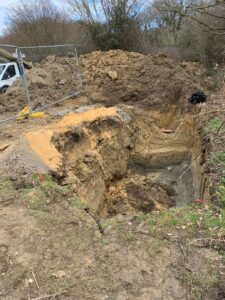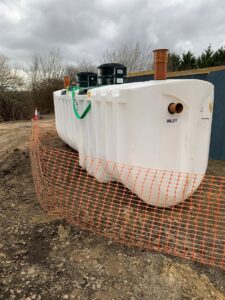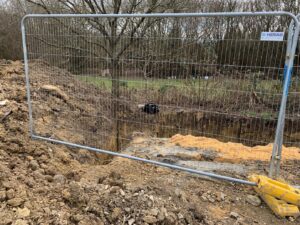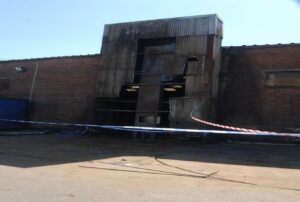Contractor sentenced after uncontrolled spread of asbestos following roof replacement work at domestic garages
A self-employed roofing contractor has been ordered to undertake unpaid work after the uncontrolled spread of asbestos in a back garden, putting two young workers and local residents at risk.
Doorbell-cam footage shows parts of an old garage roof being disposed of with a lack of control measures.
The footage has been released by the Health and Safety Executive (HSE) at the start of Global Asbestos Awareness Week today, Tuesday 1 April, to highlight the dangers.
Stephen Wilks, trading as S Wilks Roofing, pleaded guilty to breaching asbestos safety regulations after work carried out under his control led to the contamination of a residential area with asbestos-containing materials.
The court heard how Mr Wilks had been commissioned by a property management company to replace asbestos cement roof sheets on three garages off Green Walk in Bowden, Altrincham in February 2022.
HSE began an investigation after a local resident raised concerns about debris that had fallen into their garden during the work. Analysis confirmed the debris contained chrysotile asbestos.
HSE inspectors discovered ripped bags of asbestos waste stored in a publicly accessible area in front of the garages, with asbestos-containing materials spilling onto the ground and contaminating nearby undergrowth. Further investigation revealed that residents’ personal belongings stored in the garages had also been contaminated.
The footage below shows two workers under the supervision of Mr Wilks improperly clearing asbestos debris from a neighbouring garden and disposing of it in domestic waste bins, highlighting the unsafe practices that led to this prosecution.
HSE’s campaign “Asbestos and You” reminds tradespeople about the dangers of asbestos and the importance of working safely with it.
The regulator also provides comprehensive guidance for workers and employers about working safely with asbestos on its website. This includes information on how to identify asbestos, what to do if you find it, and the appropriate safety measures needed when working with or around asbestos-containing materials. Workers in trades such as construction, maintenance, demolition and installation are particularly at risk and should ensure they have appropriate training before starting work that might disturb asbestos. This guidance is available on the HSE website.
The property management company subsequently arranged for a licensed asbestos removal contractor to safely collect the waste and thoroughly clean the affected areas.
Mr Wilks pleaded guilty to breaching Regulation 11(1) and Regulation 16 of The Control of Asbestos Regulations 2012, which require proper planning and precautions to prevent exposure to and spread of asbestos during non-licensed work. He was sentenced to a 12 month Community Order with 200 hours of unpaid work and was ordered to pay £3582.13 costs at a hearing at Ashton-Under-Lyne Magistrates Court on 28 March 2025.
HSE Inspector Phil Redman said: “This was a serious incident that put Mr Wilks, those working under his control, and members of the public, at risk from the potential harmful effects of being exposed to asbestos-containing materials. Duty holders are reminded to ensure they fully control the risks associated with the removal of asbestos-containing materials that do not require removal by a licensed asbestos removal contractor.”
The prosecution was supported by HSE enforcement lawyer Kate Harney and paralegal officer Rebecca Withell.
Further information:
- The Health and Safety Executive (HSE) is Britain’s national regulator for workplace health and safety. We are dedicated to protecting people and places, and helping everyone lead safer and healthier lives.
- More information about the legislation referred to in this case is available.
- Further details on the latest HSE news releases is available.
- HSE’s campaign “Asbestos and You” reminds tradespeople about the dangers of asbestos and the importance of working safely with it. Asbestos can be found in buildings built before 2000 and is still the biggest workplace killer in Britain, causing around 5,000 deaths every year. When disturbed, asbestos releases tiny fibres that can cause fatal lung diseases and cancers. More information can be found at: Asbestos & You – Work Right to keep Britain safe
- Guidance on working safely with asbestos-containing materials can be found at: Asbestos – HSE




